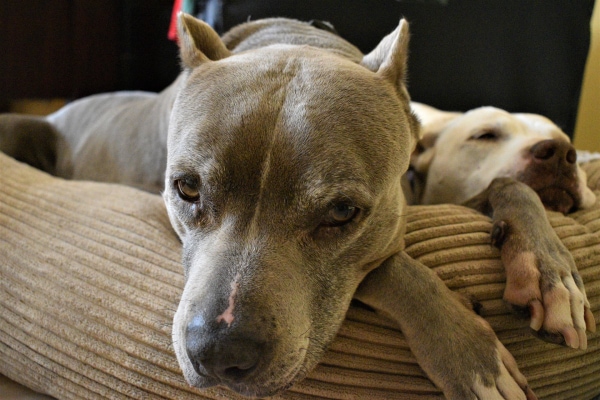A vet may prescribe trazodone for dogs who struggle with phobias, situational anxiety, or other behavioral issues. While trazodone may make these dogs less anxious, giving a new medication can be a bit anxiety-inducing for dog parents. To help you feel prepared, integrative veterinarian Dr. Julie Buzby explains the uses, dosage, side effects, and precautions for trazodone for dogs.

Phobias. Fireworks. Separation anxiety. Other anxiety-inducing situations. Sometimes when your dog is feeling nervous, help comes partially in the form of anti-anxiety medications like trazodone for dogs.
What is trazodone for dogs?
While trazodone is actually FDA approved as a human medication, veterinarians often prescribe trazodone off-label for dogs with anxiety disorders. In the past, you might have recognized trazodone by the brand names, Desyrel®, Oleptro®, and Trialodine®. However, these brand name products are now discontinued due to the availability of generic trazodone.
Can you buy trazodone without a prescription?
Trazodone is a prescription medication, meaning you cannot buy it over the counter. Sometimes your veterinarian may send it home with your dog after an appointment or surgery. Other times, your vet may have you pick up the trazodone at a local human pharmacy since it is also a human drug.
What does trazodone do for dogs?
The anti-depressant and anti-anxiety drug trazodone is a serotonin antagonist reuptake inhibitor (SARI). In other words, trazodone blocks the receptor that is responsible for pulling circulating serotonin back into the nerve cells.
As a result of this blockade, the levels of “active” serotonin in the brain are higher. This translates to lower anxiety levels and a calmer dog because serotonin, the “happy hormone,” is a chemical messenger that works to stabilize mood. Interestingly, serotonin also has effects on sleep function, blood clotting, body temperature, and gastrointestinal health, but those aspects are less relevant here.

What is trazodone used for in dogs?
In veterinary medicine, dogs may take trazodone for any number of behavioral disorders. But the most common indications are anxiety and phobias. Unlike other anxiety medications that can take several weeks to make an obvious difference, trazodone works rapidly—often within one to two hours.
This makes it a great anti-anxiety medication for short-term use during stressful events. Plus, vets or veterinary behaviorists may find it helpful for situations where other therapies and medications have not been helpful.
Trazodone is commonly prescribed to help a dog with:
- Separation anxiety
- Noise phobia (e.g., storm noises, fireworks, construction, etc.)
- Veterinary visits, during a hospital stay, or before nail trims
- Travel (e.g. riding in cars or flying on airplanes)—anxiety can contribute to dog car sickness
- New situations (e.g., first time at doggy daycare or in boarding)
- New people or pets (when company comes over or you add a pet to the household)
- Generalized anxiety
- Keeping a dog calm after surgery or injury
- Sundowners in dogs (because some sundowning dogs become very anxious)
- Other behavioral concerns
What is the trazodone dosage for dogs?
When prescribing trazodone for those situations, the vet will base the dosage on your dog’s bodyweight. He or she may choose to calculate the dose on a mg/kg basis or consult a dosing chart. Since there is a wide effective dose range, it may take some trial and error to find the right trazodone dose for your dog.
Typically, the vet will start on the lower end of the dosage range, then gradually increase the amount based on your dog’s initial response. In other words, if there appears to be very little change in your pup’s anxiety, your dog’s doctor might tell you to increase the frequency or the amount of the trazodone.

How often can I give my dog trazodone?
Sometimes the vet will prescribe trazodone for use on an “as needed basis.” For example, your vet may tell you to give one dose of trazodone the night before a stressful event. And then he or she may have you give another dose about 90 minutes prior to the event.
If this strategy doesn’t work well, the vet may change the dose or timing the next time. Or he or she may suggest using a different medication like alprazolam or adding an additional medication like gabapentin.
Additionally, if your vet prescribed trazodone to help with your dog’s travel anxiety, he or she might ask you to give a “test dose” during the several days leading up to the trip. This allows you to figure out if your dog becomes adequately calm and see if he or she experiences any adverse effects. Then, based on the “trial run,” your vet can change the dose, directions, or medications as needed prior to the trip.
Using trazodone on a regular basis
In other situations, your vet may recommend giving trazodone two or three times a day on a regular basis. For example, this might be the case if the goal was using trazodone to facilitate post-surgical confinement in dogs or reduce generalized anxiety. Once again, it is beneficial if you give feedback on how your dog is doing at that dose of trazodone. That way your vet can change the dose if indicated.
Can a dog overdose on trazodone?
No matter whether your dog is taking trazodone occasionally or daily, it is important to follow the label instructions. Do not modify your dog’s trazodone dose on your own or share your prescription of trazodone with your dog. This is critical because while the dose range is large, it is possible for a dog to overdose on trazodone.
Signs of a trazodone overdose in dogs include:
- An unsteady gait (i.e. ataxia)
- Disorientation
- Urinary incontinence
- Seizures
- Tremors
- Changes in heart rate or blood pressure
- Depression
If you see these signs, contact your vet or bring your dog in for an emergency vet visit immediately.
Additionally, if you accidentally give your dog more trazodone than what is recommended on the prescription label, it is best to seek veterinary advice. To get help, you can call your regular veterinarian, your local emergency vet, or an animal poison control center like the Pet Poison Helpline or the ASPCA Animal Poison Control Center. (A fee may apply when calling an animal poison control center.)

How do you administer trazodone?
When you get ready to give the trazodone to your dog, you will notice that it typically comes in 50 mg, 100 mg, 150 mg, or 300 mg tablets for oral use. However, if your dog won’t take pills, your vet can contact a compounding pharmacy about making trazodone into a liquid or chewable tablet.
To help increase its absorbability, it is best to give your dog the trazodone with food or a small treat. Trazodone can still work on an empty stomach. But giving it with food can increase its bioavailability (i.e. amount of drug that enters circulation) by 20 percent.
How long does it take for trazodone to work in dogs?
For the average dog who needs short-term relief of anxiety, it takes about one to two hours for trazodone to kick in. And when used daily as a long-term anxiety management strategy, trazodone takes about two to three weeks to reach maximal efficacy. This is relatively quick compared to other anti-anxiety medications like fluoxetine, which can take four to six weeks to achieve the full effect.
How long does trazodone last in dogs?
Generally, the effects of trazodone will last several hours. And a single dose should wear off completely within 24 hours from the time of administration. However, if your dog has been taking trazodone more frequently, it can take longer for the effects to wear off.
Also, trazodone is one of many medications that relies on the liver and kidneys for clearance from the body. This means that the effects of trazodone can last longer than normal if your dog has liver disease in dogs or kidney failure in dogs.
What are the side effects of trazodone in dogs?
While preparing to give your dog trazodone, you may also want to be aware of any potential side effects. Thankfully, studies indicate that about 80 percent of dogs taking trazodone will experience no side effects. Also, since it is a short-acting medication, any unexpected side effects will likely wear off after several hours.
Trazodone side effects in dogs can include any of the following:
Vomiting
Trazodone can upset a dog’s stomach and cause vomiting, especially when given on an empty stomach. Typically, giving the trazodone with food is an easy solution for this problem.
Diarrhea
Since trazodone may cause colitis (i.e. inflammation of the colon), you might notice your dog is having diarrhea but acting fine.
Gagging
Your dog may make a gagging or retching sound. It may or may not be accompanied by vomiting.
Agitation or increased anxiety
Occasionally trazodone has the opposite effect than intended and actually makes the dog more anxious or agitated.
Aggression
It is important to use caution when giving trazodone to dogs with aggressive tendencies because it could potentially contribute to behavioral disinhibition (i.e. dog doesn’t stop him or herself from doing an undesirable behavior like biting). This is a risk with many behavior-modifying or anti-anxiety drugs, not just trazodone.

Increased appetite
Your dog may seem hungry all the time, start counter surfing, or raid the trash.
Sedation or lethargy
Some sedation is common with certain dosages of trazodone, and that isn’t necessarily a bad thing if the dog is recovering from surgery or facing a stressful event. However, if you don’t know that your dog might be acting a bit sleepy or spacy or being a lethargic dog, it can throw you off.
Hypersalivation
Your dog might be drooling more, or you may notice your dog keeps licking his or her lips.
Increased panting
Even when it is not warm out or your dog hasn’t recently exercised, he or she may still be panting. Sometimes he or she might also be panting and pacing.
Ataxia
Dogs who received a higher dose of trazodone IV did show some ataxia (i.e. wobbly gait), in a small study, but dogs receiving the same amount by mouth did not become ataxic. (The same was true with arrythmias—they were present in dogs who got the dose IV but not by mouth).
Urine retention, urinary accidents, or increased urge to urinate
At this time, the verdict is out on whether changes in urination are truly a side effect of trazodone in dogs. In humans, trazodone can cause urine retention or an increased urge to urinate. However, it isn’t known if the same is true for dogs, or if the urinary changes some dog parents may report are unrelated to trazodone.
An additional explanation is that if the dog is more sedate due to the trazodone, it is possible that he or she may awake from a deep sleep, suddenly realize he or she desperately need to urinate, and not be able to make it outside in time. The end result could be a urinary accident or leaking urine.
Withdrawal side effects
Also, if your dog has taken trazodone regularly for many weeks or months, and you suddenly stop giving it to him or her, there may be an increased risk of anxiety, agitation, and trouble falling asleep. Therefore, it is important to slowly wean dogs off of trazodone to prevent these withdrawal side effects.

Serotonin syndrome in dogs
All of the common side effects we discussed up to this point are fairly mild and should not be life-threatening. However, when trazodone is combined with other anxiety medications like fluoxetine, sertraline, or selegiline for dogs, there is an increased risk of developing a disorder called serotonin syndrome. This dangerous disorder occurs when there are excessive amounts of circulating serotonin.
Besides the symptoms mentioned above, other signs of serotonin syndrome in dogs can include:
- Difficulty breathing (i.e. a dog who is breathing fast)
- Dilated pupils or blindness
- Excessive salivation
- Hypotension (i.e. low blood pressure)
- Elevated heart rate or abnormal heart rhythm—which is why knowing how to check your dog’s vital signs is important
- Hyperthermia (i.e. higher body temperature)
- Disorientation and abnormal gait (i.e. ataxia or a dog who is wobbly and off balance)
- Seizures in dogs
- Coma and/or death
If any of these more serious side effects occur, you should contact your veterinarian immediately. Typically, he or she will instruct you to take your dog to the clinic or an emergency veterinary hospital.
Can trazodone be administered with other medications?
This risk of serotonin syndrome emphasizes the importance of informing your vet about any medications or supplements that your dog may be taking. While there are plenty of situations where it may be safe to give trazodone at the same time as another medication or supplement, there are other times when it can be quite dangerous.
Trazodone and gabapentin for dogs
Trazodone can safely be prescribed with gabapentin for dogs, and this is a fairly common combination for some situations. To understand why they play well together, it is helpful to know that veterinarians use gabapentin in dogs to relieve pain (especially nerve pain), control seizures, and reduce anxiety.
So sometimes there may be a situation where a dog is already taking gabapentin for pain and the vet will want to add on trazodone for situational anxiety. Or there may be cases where your vet asks you to give gabapentin and trazodone simultaneously prior to a veterinary appointment if your dog is fearful and aggressive.
Since both these drugs can cause sedation, please keep in mind that using trazodone plus gabapentin may cause your dog to be even more sedate than giving either drug on its own. This isn’t necessarily a bad thing, just something to be aware of.
Does trazodone help with pain in dogs?
Trazodone has one main sphere of action—controlling anxiety and promoting calmness. Unlike gabapentin, trazodone does not help with the physical sensation of pain in dogs in a significant way. However, since there is also a psychological aspect of pain, trazodone can help painful dogs be less anxious from the pain.
Remember though, if you are seeing signs your dog is in pain, please reach out to your vet for advice rather than reaching for the trazodone. There are more effective options for pain control in dogs than trazodone on its own.
Trazodone and other drugs: unsafe combinations
As we just mentioned, combining trazodone with some anxiety and anti-depressant medications can be dangerous due to the risk of serotonin syndrome. This is particularly the case for medications like selective serotonin reuptake inhibitors (SSRIs) and monoamine oxidase inhibitors (MAOIs) because they also increase serotonin levels. Therefore, dogs who are on other anxiety medications should not take trazodone unless directed by a veterinarian or a board-certified veterinary behaviorist.
Also, since trazodone can have a mild sedative effect, be careful when using it with other calming medications and supplements. This combination can lead to excess sedation or central nervous system depression.
Studies also suggest that giving trazodone with non-steroidal anti-inflammatory drugs (NSAIDs) or anticoagulant medications may increase the risk of gastrointestinal ulcers and bleeding. Additionally, you need to be cautious giving trazodone to a dog who is taking any of the following prescriptions:
- Antibiotics (especially fluoroquinolones and macrolides)
- Antifungal medications (e.g., ketoconazole)
- Blood pressure medications (e.g., digoxin)
- Diuretics (e.g., furosemide)
- Prokinetic drugs (e.g., metoclopramide, cisapride)
- Tranquilizers (e.g., acepromazine)

Which dogs should not take trazodone?
In addition to being cautious when prescribing trazodone for use with certain medications, there are also a few situations in which trazodone is contraindicated.
If your furry friend has had problems taking trazodone in the past, it is best to avoid using it. Instead, ask your vet for other recommendations regarding your dog’s anxiety. This may involve trying other medications, calming supplements, or environmental modifications.
Since trazodone can lower blood pressure, it should be avoided in cases of heart disease in dogs. Also, trazodone may worsen glaucoma in dogs, a condition where the pressure inside of the eyes is higher than normal. Finally, if the liver or kidneys are impaired, it may be more difficult for trazodone to be metabolized by the body, thus causing lingering effects.
In reproductive studies for animals, very high doses of trazodone negatively affected fetal development. And there currently isn’t any information available that describes the safe use of lower-dose trazodone in pregnant or lactating dogs. Therefore, it may be best to avoid trazodone in these cases unless your vet determines the benefits outweigh the risks.
Talk to your vet about trazodone for dogs
If a long car trip, going for a vet visit, or having company over is stressing out your dog, why not talk to your vet about trazodone? It is generally safe for dogs, works quickly, and is well-suited for situational anxiety. Hopefully, with a bit of trazodone your dog can start feeling more relaxed in those situations. And you can feel better knowing that your dog isn’t so anxious anymore.
How has trazodone helped your dog’s anxiety?
Please comment below.


Hi
We have a 13 year old terrier/cavalier mix.
He’s always been an active dog with typical terrier instincts.
Over the last year or two he’s devolved some arthritis & a few other issues but stayed active & very much a normal dog.
More recently he’s struggled with anxiety at night, this starts around 9pm (uk Time) & was continuing throughout the night. Whining/ pacing & barking. We took him to the vet who prescribed Trazodone along with the gabapentin for arthritis. But the trazodone seems to make him wired for at least 2/3 hours then he settles.
He wan
Hi Martin,
I am sorry your senior guy is having issues with nighttime anxiety. It is possible this could be a sign of dementia or canine cognitive dysfunction. While Trazodone works well for some dogs, it may not be the best option in every situation. I think it might be time to talk to your vet about trying some different supplements or medications. There are antianxiety medications, melatonin, CBD products, and calming collars/sprays/shirts etc. I will attach links to other articles with more information. Hoping you can find what works best for your pup. Wishing you all the best and praying for peace and rest in your home.
1. Senior Dog Anxiety at Night? 9 Solutions for Better Sleep
2. Sundowners in Dogs: A Veterinarian’s Guide
3. Signs of Dementia in Dogs: Stages, Symptoms & Treatment
4. MCT Oil for Dogs Can Help Dogs with Dementia or Epilepsy
Hi
We have a 13 year old terrier/cavalier mix.
He’s always been an active dog with typical terrier instincts.
Over the last year or two he’s devolved some arthritis & a few other issues but stayed active & very much a normal dog.
More recently he’s struggled with anxiety at night, this starts around 9pm (uk Time) & was continuing throughout the night. Whining/ panting/ pacing & barking. We took him to the vet who prescribed Trazodone along with the gabapentin for arthritis. But the trazodone seems to make him wired for at least 2/3 hours then he settles.
He constantly wants feeding & continues the anxiety issues he had previously to the meds.
Are these normal side effects ?
Also do you have any other suggestions to help him stay calm in the evenings?
I’ve read that CBD oil can help or is this dangerous?
We’re going to get back to the vets once Christmas period is over. Hopefully they decide another method to help him settle at night.
Hi Martin,
I am sorry your senior guy is having issues with nighttime anxiety. From what you describe, I am suspicious your pup may be experiencing the early stages of dementia (canine cognitive dysfunction). CBD may be helpful and there are also lots of other supplements and medications you can try. I will attach links to other articles with more information. I hope this will help guide your next conversation with your vet and you can partner together to find the best solution for your boy. Wishing you all the best and feel free to leave an update if you have a chance.
1. Senior Dog Anxiety at Night? 9 Solutions for Better Sleep
2. Sundowners in Dogs: A Veterinarian’s Guide
3. Signs of Dementia in Dogs: Stages, Symptoms & Treatment
4. MCT Oil for Dogs Can Help Dogs with Dementia or Epilepsy
5. CBD Oil for Dogs: Facts, Benefits, Concerns [2024]
My baby prince is a 15 year old Yorkie. He has very bad anxiety so the vet advised I tried trazadone before our flight home for Christmas. I gave as prescribed 100 mg to my 10lb baby. After about a hr he began to howl, like I never heard before but it soon stopped. He went to sleep . As I got to tsa I had to take him out his carrier and formed stool came out as I took him out his carrier. It was only one event it didn’t happen anymore. Nevertheless I am a nurse of humans so I checked his breathing and heart rate and it was normal but he was very lethargic. It appeared as if he was having the best sleep of his life. Keep in mind I administered the med at 11am and now it is 4:54am and he is still sleeping . I try to wake him up and he will open his eyes but he goes right back to sleep. FYI he is still breathing normally . At what point should I be concerned? As well I forgot to mention gabapentin was given 30 mins before the trazadone as the vet told me this was safe… because my puppy has pain. I have decided if it lasts after 24 hrs I should probably call the vet. What have I done to my baby.
Hi Renay,
I understand your concern for your senior guy. While your boy may be slightly more sedated than what was expected, it does sound like he is resting well and anxiety free. Without examining him myself, I can’t be sure that there is nothing more serious happening here. I do think in the future the dosage of these medications will need to be adjusted to find the ideal combination. Go ahead and contact your vet so they are aware of this issue and can help offer guidance for your return flight home. Hoping your sweet boy can sleep away these drowsy effects and will wake up feeling refreshed in a few more hours. Have a good visit with family and wishing you a very merry Christmas. ♥
My reg vet is closed as this is a holiday week but he is for sure resting . We got up and he urinated, ate food and drank water and then back to sleep he went . I think he should be fine … he is just very very sedated , way more than I would have liked but he is def not in pain. I will see how he does by the next couple of days. I can strangely say I miss him whining and jumping all over the place . Strange I know lol thank you and happy holidays to you and your family!
Hi Dr Buzby
We have a 2 year old Mini Schanuzer that has has seperation anxiety and reacts to big dogs. Our vet have just started our dog on Trazodone and I was wondering if you have any pro training tips to go with the Trazodone as we hope to be able to leave our dog home alone for 4-5 hours per day in the long run.
Hi Florence,
I am sorry your young dog is living with this debilitating anxiety. While a veterinary behaviorist would be better suited to offer guidance and information for this specific situation, I can say that I have had great success with crate training. I understand that crates are not for every dog, and some do worse with them than without. But for most dogs, a crate offers a safe space they can have as their own and find it very comforting. Hoping you can find the best ways to give your sweet pup relief and peace. Wishing you all the best of luck!
Hello!
I have a 45lb entlebucher mountain dog named Marley! She is almost three and has terrible separation anxiety. My vet suggested 100mg of Trazodone prior to leaving the house, 4 times per week. When I give her the full dose, she seems very tired and lethargic. Do you think giving her half of the dose prescribed would still be beneficial (50mg)? I want to help her anxiety when I’m gone, but the 100mg dose seems a little too effective.
Thanks for your help!
Hi Natalie,
I understand your concern for Marley and think it is great you are trying to find ways to make her more comfortable. I am not sure what effect the half dose would have on her. The only way to know for sure is to try it and see how things go. I do think you should talk with your vet about changing the dosage as they may have better ideas of how to adjust it a little at a time to prevent unwanted side effects. Hoping you can find the “sweet spot” for her medication and ensure she is happy and relaxed while you are away. Best of luck to you both and keep up the good work.
I adopted a Shih Tzu mix (maybe Chihuahua, terrier or possibly devil spawn!) 6 months ago. He is likely in the 2 year old range and came from a truly horrible situation. Despite that, he is a happy, loving little boy. However, he does come with some baggage, most notably fear and anxiety. Understandably, he’s afraid of other people and animals, and his go to response to things that scare or ‘threaten’ him is to bark (sounds vicious even though he’s just a 12 pound boy), lunge, and generally act as if he’s going to tear them apart. I’ve been working with him and have had some success, but we’re still unable to go for walks during the day when other people or dogs are likely to be out. My regular vet gave me Trazadone to give Remy, but I feel like I’m drugging him and stifling his happy, bouncy personality, so I haven’t given it to him. The vet also gave us CBD oil, which I did give him. I saw some improvement at first, but it seemed to lose effectiveness (I think). I took him to my integrative vet and she gave me Nutricalm and a shen calmer, and I’ve been giving both to Remy for about a month. I’m not sure they’re working, either, so I’m starting to reconsider trying the trazadone. I really only want to help Remy be the best boy he can be—I can deal with his behaviors while I’m training him—but I hate that he’s so afraid of everything, and I don’t want him to feel that way or like he needs to protect himself or me from everything. I want him to be able to go on daytime walks and enjoy the world around him without fear or anxiety. Is giving him trazadone a good thing for him, or is it just an easy fix for me to deal with his behavior? I want to do what’s best for him, not what’s easiest for me.
Hi Stacey,
I am sorry Remy is dealing with this crippling anxiety and stress. I understand your concern and think it is great you are working with him to improve his behavior and modify his fear response. It is hard to know if the trazodone will be the miracle cure you are hoping for without giving it a try. My recommendation would be to start the medication, give it a few days to see what kind of response you get, then if you don’t like what you see, your vet can help you wean Remy off the trazodone and try something else. This isn’t just about an easy fix for you (although your quality of life matters too!), but we don’t want Remy wasting these valuable years stuck in patterns of anxious behavior. He deserves to be free and living his best life. Praying for calm days and peaceful nights. Feel free to keep us updated on how things are going.
Thank you for this article. It’s very helpful. I have a 15 yr old chihuahua who is experiencing symptoms of ccd (constant barking, separation anxiety, soiling in the house, staring at nothing for periods of time, anxious and pacing, etc), along with a mild trachea collapse, heart murmur and joint issues. However, he is still eating, and has limited bouts of activity and interaction with me. I can often tell when he doesn’t recognize me or is having an off day and I need to give him extra attention so he knows he’s safe. The vet prescribed trazodone up to 3x a day to help with these symptoms. And it does help. However, once it kicks in, he is lethargic, just sleeps and barely eats until it starts to wear off.
He’s been on it now for a few months and I’m starting to wonder about his quality of life. How long does this stage last? and how do you determine when it’s his time if he’s still existing, if not thriving? Any light you can shed would be much appreciated.
Many thanks,
Benny’s mama
Dear Ana,
My heart goes out to you as you try to navigate this difficult path with Benny. Unfortunately, there is no set amount of time for when this stage will end, and things will progress. Each dog is different, and the rate of decline just can’t be predicted. I will attach links to other articles with more information about how to determine quality of life and great advice on how to know when is best to say goodbye. Praying for Benny’s comfort and for your strength as you face each new day. Bless you. ♥
1. Using a Quality of Life Scale for Dogs
2. Dementia in Dogs: When to Euthanize Your Beloved Senior Dog
3. How Will You Know When It’s Time to Euthanize Your Dog? 5 Caring, Heartfelt Messages
4. Preparing for Your Dog’s Euthanasia: 10 Thoughts for Peace
could you explain the difference in trazodone and Sileo?
Hi Sherry,
This is a great question! While Sileo (dexmedetomidine) is a sedative, trazodone is an antidepressant and antianxiety medication. So, while Sileo can help with anxiety due to its sedative properties, it is not an actual antianxiety drug. This is why trazodone can be helpful with other behavior issues such as aggression. I hope that helps to clear things up a bit without getting into all the technical details. Best wishes to you and yours!
My 16 year old Chihuahua (8 lbs) was diagnosed with CHF 3 years ago and has kidney disease since she’s been on meds for so long , including diuretics. She goes to the vet for fluids 3x a week but is still feisty so the vet prescribed 25 mg of Trazadone 2 hrs before her 3/week appts. Vet says it’s safe but I keep reading it’s not a good idea for heart and kidney disease. What’s your opinion?
Hi Nancy,
I understand your concern for your senior girl. It can be hard to maintain the delicate balance of benefits verses risks especially when there are so many complicating factors. Like the article mentions, trazodone is metabolized by the liver and kidneys. If either of these systems is not working properly it can take longer to eliminate this drug from the body causing lingering effects. Also, trazodone does lower blood pressure. This could cause a problem for dogs with certain heart conditions. Since I am not up to date on all the specifics of your dog’s medical history, it is hard to make detailed conclusions or recommendations. Feel free to look back over the section of the article titled “Which dogs should not take trazodone?”. If you still have lingering concerns about the use of this medication, don’t hesitate to discuss them with your vet. Ultimately, you have to go with your own intuition. You need to be comfortable and confident with the decisions being made. You are doing a great job advocating for your dog’s health and well-being. Keep up the good work!
I have a 23-pound morkie and he got prescribed a combination of 100 mg of Trazodone and 100 mg of gabapentin for stressful events but I give it to him mostly for separation anxiety, so each time I leave home. My concern is that it can be a few times a week. Will this affect him in any ways?
Hi Marie,
I would not expect any negative side effects although they are a possibility with any medication. Both of these medications can be given long term and I have patients that take them every day. Make sure you are monitoring your pup closely, and if you have any concerns don’t hesitate to contact your vet.
My 14 year old ShihTzu takes 1/4 of a 100mg Trazadone twice daily. Last night about an hour after her evening dose she started whining and panting. Almost like a panic attack It finally stopped after a couple hours. She has trachea issues and is on Hydrocodone. I’ve talked to my Vet and she said Teazadone is a very safe medication. What could be her problem? I’m very confused and hope you can help
Hi Cindy,
I understand your concern for your senior girl and this strange behavior you witnessed last night. Without examining her, myself, there is really no way for me to know what the cause of her episode could be. Make sure you keep a log of any other worrisome behaviors you notice. The more information your vet has to work with the better. Also, if this happens again, maybe you can catch it on video. Sometimes there are key things your vet may pick up on, which aid in making a diagnosis, that can be easily missed if you don’t know what to look for. Hoping all is well and you never have to worry about this happening again. Wishing you and your sweet girl the best.
This is an old thread so you may not see this now, just doing a little internet search. My 13 year old terrier-chihuahua mix was prescribed trazodone almost two weeks ago for anxiety. After taking it, he has been exhibiting almost identical symptoms that you describe (pacing, whining, panting, jumpiness) for about two hours until he finally calms down. He’s also on gabapentin which he’s been taking for over a year now. He has been getting anxious at night previously, which was a reason we started the trazodone, but it seems to ultimately make things worse – at least for the first couple hours. Sorry this is so long-winded. Just curious how your experience turned out?
Hi Lauren,
I am sorry your pup is having these unwanted side effects from the Trazodone. Hopefully Cindy will see your message and get back to you with more information. Hoping you can find the best way to restore your boy’s quality of life and bring peace and rest back to your household. Bless you.
I had an English Springer Spaniel who developed vestibular disease. The vet recommended Trazadone, and we started her on the lowest dose. Within 15 minutes, she started howling like I’ve never heard before. She was absolutely having a negative reaction to the drug. She howled for hours, before finally falling asleep. I felt so utterly helpless; a horrible experience.
Hi Bonnie,
I am so sorry your Spaniel had such a negative experience with Trazodone. Without witnessing the episode, myself, it is hard to say for sure what the cause could have been. I am suspicious your girl may have been in the 20% that can have an increase in anxiety/agitation when initially starting this medication. I am glad the howling stopped, and she was able to fall asleep once the medication worked its way out of her system. Thank you for sharing your story with our readers as this may help someone else in a similar situation. Best wishes!
Thank you so much for the thorough article! Our vet prescribed Trazodone for night anxiety. We just gave the first small dose and in 1.5 hrs our old dog became very agitated in a way he never normally does. This lasted a few minutes until he gagged at which point he totally relaxed, so we think he was just reacting to the nausea. But we found this page and reading through it while we were freaking out helped us figure out what was going on. Thank you!!
Hi Robin,
I am sorry your boy had this negative reaction to the initial dose of medication. Hoping he adjusted well, and the Trazodone was able to offer him peace and rest at night. Feel free to leave an update and let us know how things are going. Best wishes to you and yours!